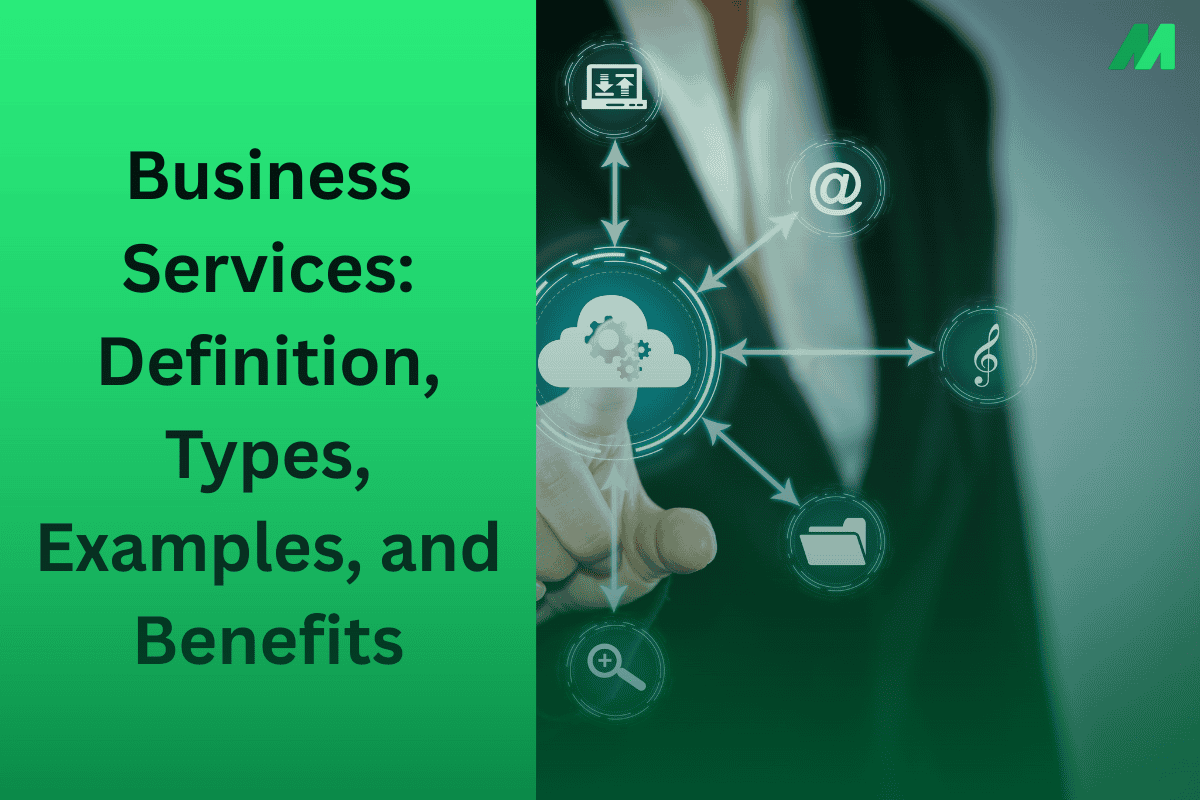In today’s business world, a company’s success isn’t just about its products. There’s a whole support system of services that helps companies run smoothly and adapt to changes. We call these business services.
If you’re studying business, starting a company, or just want to know how businesses really work, it’s important to understand these services.
What Are Business Services?
Business services aid companies in their work, though they aren’t physical products. These services can’t be touched or stored, but they are key to how any group runs. They include things such as money and legal help, computer solutions, and shipping oversight.
Unlike goods that can be held and counted, services are used the moment they’re given. They often require talk between the giver and user, and how good they are can change with the situation and people on hand.
Nature of Business Services
Business services are different from physical products because they are not touchable or held in stock, and customers consume the services the moment they are produced.
One important characteristic of business services is their intangibility. The service itself has no physical form; it is only through engagement or interaction and the practical or reflective outcomes of the engagement that the customer comes to regard the value of that service. This causes the customer to depend on trust, reputation, and measures of service quality to be attracted to these services.
The second is inseparability. The service is produced and consumed at the same time; therefore, in many cases, quality is found in the performance of the service provider during the delivery of that service.
Perishability distinguishes that these services cannot be stored or saved for later consumption; if service capacity goes unused, the opportunity is lost.
Business services are often heterogeneous, which means that the service experiences can never be identical because there is variability depending on who delivers the service and the conditions of the service.
Lastly, the buyer takes a great part in the service experience. They frequently have some level of role in the participatory process that shapes and co-creates the service outcome.
These characteristics help distinguish business services from physical products and create influences on the marketing, delivery, and management of service quality by firms.
Types of Business Services
Business services can be categorized into several major types, each serving a distinct purpose.
1. Professional Services
Professional services represent specialized expert knowledge that is provided to businesses; this includes legal advice, accounting and other professional consulting. These professional services assist businesses in understanding complex regulatory environments and ensuring compliance, managing financial accounts appropriately, and developing strategic choices.
Through professional service provision, a business can use sources of expertise that may not exist internally and gain knowledge that could translate into better risk management, operational efficiency, and eventual business growth.
2. Financial Services
These services help companies handle their money and risks well. This covers things like banking, insurance, managing what you own, and giving advice on investments. Banks and advisors assist companies in getting money, protect what they own with insurance, and make smart investments to get the most money back. These services are very important for keeping a business healthy financially and helping it grow over time.
3. Information Technology Services
They are important to the way businesses operate today, as they service software development, IT infrastructure management, cybersecurity, and cloud computing. They provide support to run technology smoothly, protecting data from cybercriminals, and help organizations leverage new technology with the intention of using it as a strategic advantage.
Outsourcing IT services allows organizations to obtain leading-edge solutions to business and technology challenges and make those solutions available internally without investing heavily in internal talent.
4. Logistics and Supply Chain Services
It involve the coordination of the efficient movement, storage, and delivery of products from suppliers, through a business, and finally to customers. Good logistics ensures that goods are transported efficiently, on time and within budget, inventories are well-managed, and customers are served in the order process.
Supply chain services also optimize the procurement, manufacturing, and distribution activities that occur before it is consumed. Logistics and supply chain management are essential functions of any business, and will ensure customer expectations are met, costs are minimized, and consistent business operations are maintained in a global marketplace.
5. Marketing and Advertising Services
Businesses are able to advertise their products and build brand awareness through marketing and advertising services. Often, marketing and advertising services include market research and analysis services, campaign management and performance measurement, social media strategy (plan and posting), content development and production, and brand development and website services.
Marketing agencies and freelancers who act as marketing departments use creative and data-driven approaches that help businesses grow and gain market share and drive sales in highly competitive markets.
6. Training Services
These services center on expanding employee abilities and enhancing workforce skills. This includes hosting workshops, seminars, e-learning programs, and customized corporate training in specialized areas, as well as training people how to strengthen the skills in their areas of responsibility – for example, Leadership, Technical Skills, Compliance and Regulations, etc. Good training enhances employee performance, job satisfaction, and organizational productivity.
7. Event Planning Services
Event planning companies put together business events. They handle everything, like finding a place, food, schedules, staff, and how things move. Basically, they are responsible for planning a great event, so the company can focus on its usual work and make the event count. Good event planners will keep things running without problems and help make a good impression on everyone who attends.
8. Consulting Services
Organizations take expert advice in areas like strategy, finance, operations, and technology through consulting services. Building from a diagnosis of a challenge, opportunities, consultants provide actionable recommendations to drive performance. Companies that use consulting services make better decisions, find best practices, and adapt to change.
9. Technical Support Services
Tech support helps companies fix computer problems. This can include things like a help desk, keeping networks running, fixing software, and repairing computers. Good tech support means less time wasted when things break, so businesses can keep working and provide good service.
10. Bookkeeping and Accounting Services
Keeping good financial records is super important for any biz. Bookkeeping and accounting are all ’bout keeping track of your money, getting your taxes right, and handling payroll. When you hire someone else to do this, you can put all your energy into the important stuff and know your money situation is in good shape.
11. Translation Services
These services help companies talk to people around the globe. They change documents, ads, and other stuff into different languages. Good translators make sure everything is correct and makes sense to the local culture, which helps businesses grow and connect with customers worldwide.
12. Cleaning and Maintenance Services
These services help maintain cleanliness, safety and proper maintenance for business facilities. Such services include all-inclusive cleaning, maintenance of apparatus, and repair. A proper, clean, and organized workspace creates good morale for staff, improves productivity, and presents your company as respectable.
Examples of Business Services in Action
To illustrate how business services function in real-world scenarios, consider the following examples:
| Business Service Type | Description | Real-World Company Examples |
| Logistics and Supply Chain | Managing transportation, warehousing, and distribution | Mahindra Logistics, TVS Logistics, FedEx Express India, Delhivery |
| Financial Services | Banking, insurance, asset management, and financing | HDFC Bank, ICICI Bank |
| Information Technology (IT) | Software development, IT support, cybersecurity | Infosys, Tata Consultancy Services (TCS), Wipro |
| Marketing and Advertising | Brand building, marketing campaigns, and social media | Ogilvy, Wunderman Thompson, WebFX |
| Professional Services | Legal advisory, accounting, auditing, consulting | PwC, Deloitte |
| Consulting Services | Strategic advice and operational improvement | McKinsey & Company, Boston Consulting Group |
| Technical Support Services | IT support, troubleshooting, and network maintenance | IBM, HCL Technologies |
| Bookkeeping and Accounting | Financial record-keeping, payroll, and tax compliance | Zoho Books, QuickBooks |
| Translation Services | Multilingual translation and localization | Lionbridge, TransPerfect |
| Cleaning and Maintenance | Facility cleaning, upkeep, and equipment maintenance | ISS, Sodexo |
Benefits of Business Services
Business services offer a wide range of advantages that contribute to organizational success. Such as:
- Operational Efficiency. Non-core services such as payroll, IT support and logistics can often be outsourced to allow a business to concentrate on its real goals, which means more efficient use of resources and streamlined operations.
- Cost Reduction. Dedicated service providers are usually a more cost-effective solution than maintaining an in-house team. Hiring a service provider can allow a business to avoid many of the direct costs associated with hiring (recruitment, training, infrastructure, etc.).
- Access to Expertise. Business service providers will have a depth of knowledge and experience with the service, which can mean high-quality results or informed decision-making.
- Flexibility and Scalability. Services can be arranged for either short-term or long-term needs, and can be increased or decreased based on need. For example, businesses can increase their marketing for peak seasons but decrease their marketing during slow times.
- Improved Customer Experience. Many business services directly improve aspects of the customer experience, i.e., prompt delivery, knowledgeable and responsive support, and securing digital experiences.
- Risk Management. Legal, financial and corporate compliance services can help you navigate regulations and avoid costly mistakes. Insurance is also a business service to cover unforeseen loss.
Choosing the Right Business Services
Selecting the right services is crucial for maximizing value and minimizing risk. Here are a few guidelines to help businesses make informed choices:
Identify which functions are slowing down operations or require specialized expertise. Determine how much you can invest in external services without compromising profitability.
Look for service providers with a strong reputation, relevant experience, and positive client feedback. Test a service with a short-term contract before committing to a long-term partnership. Regularly evaluate the effectiveness of the service and its impact on business outcomes.
Business services support firms operating in difficult markets. They offer services ranging from finance to customer service, and impact all aspects of a business made up of at least one employee and an owner. Although intangibles cannot be seen, they impact your business significantly.
As companies change, so will the need for specialized, fast, and scalable services. Businesses that understand business services make better decisions, produce better results, and provide better value for customers. Even if starting a small business or running a larger operation, you have to use the business services to keep up.




